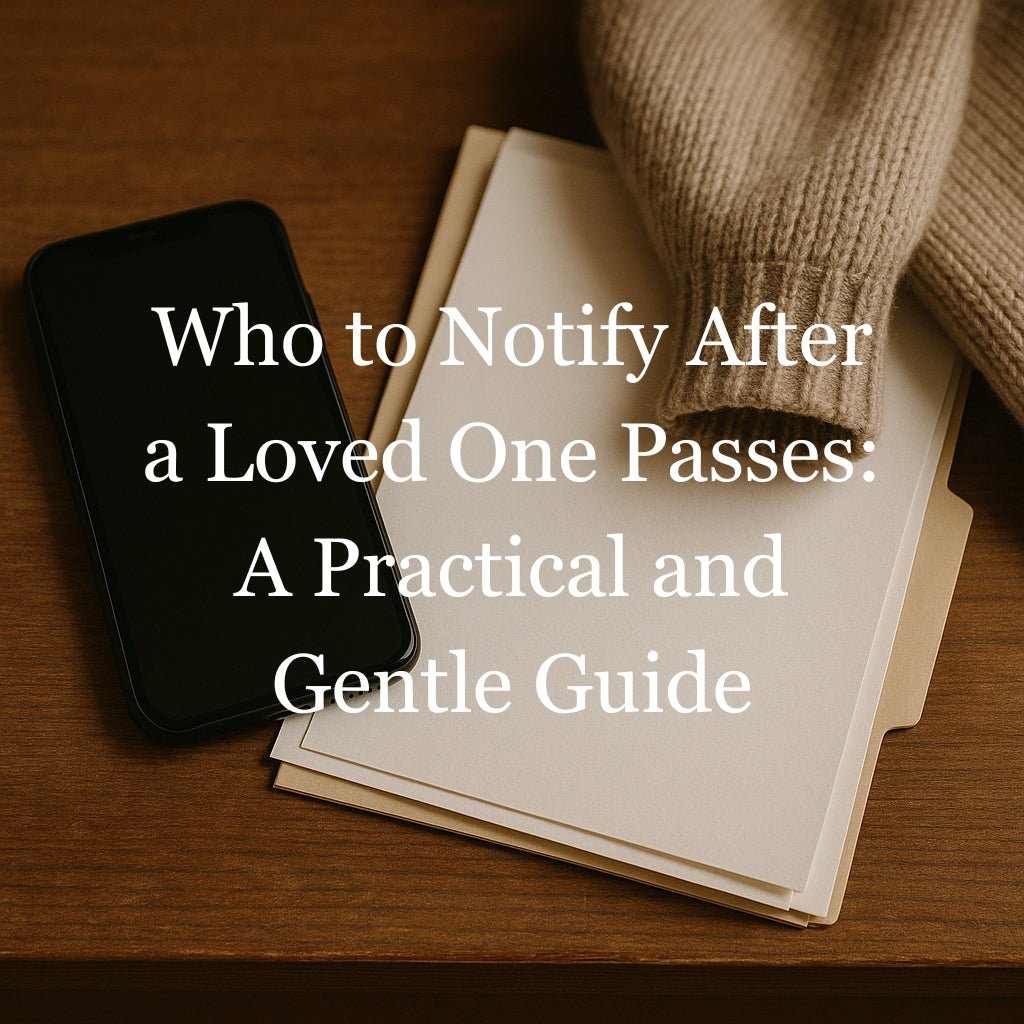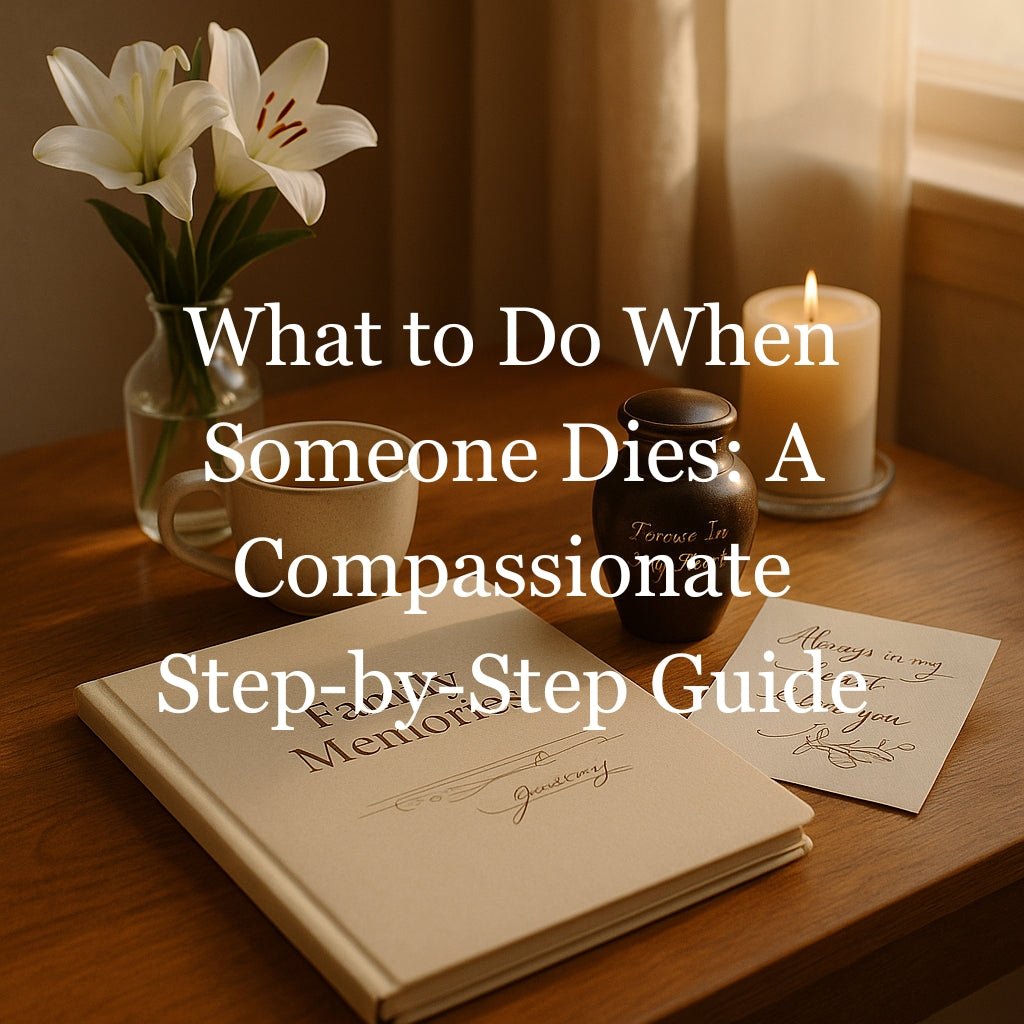What to Do When Someone Dies: A Compassionate Step-by-Step Guide
What to Do When Someone Dies in the UK: A Step by Step Guide with Gentle Support
When someone close to you passes away, the world feels different. You may feel numb, overwhelmed, or completely lost. That is okay. You are not alone. This guide is here to help you understand exactly what to do, at your own pace, with the practical steps clearly laid out.
1) Take a Breath and Make the First Call
Before anything else, allow yourself a moment to sit and breathe. You do not have to do everything right away. But there is one important first step.
If the person died at home and it was expected
Call their GP surgery. If it is outside of working hours, you can call 111. A doctor will come out to confirm the death and give you a Medical Certificate of Cause of Death.
If the person died at home and it was sudden or unexpected
Call 999 immediately. Ask for both an ambulance and the police. Paramedics will confirm the death and the police will help guide you through the next steps. The death may be referred to a coroner if it is sudden or unexplained.
If the person died in hospital or a care facility
The staff will confirm the death and provide the medical certificate. They will also guide you through what happens next. They are used to helping families and will do so with kindness.
2) Tell the People Closest to You
Let close family and friends know what has happened. This can be one of the hardest parts. You do not have to tell everyone at once. If you feel overwhelmed, ask a trusted person to help make some of the calls or send messages for you.
3) Choose a Funeral Director
Once the death has been verified and the medical certificate is available, contact a funeral director. They will arrange to bring your loved one into their care. If a coroner is involved, the funeral director will wait until the coroner has released the body.
If the person had funeral plans in place, now is the time to check them. This might include a pre-paid funeral plan or wishes written in a will.
4) Register the Death
In England, Wales, and Northern Ireland, you must register the death within five days. In Scotland, the deadline is eight days.
You must do this at the Register Office in the area where the death occurred. You will need to book an appointment.
Take the following information with you:
-
The Medical Certificate of Cause of Death
-
Full name, date of birth, and place of birth of the person who has died
-
Their address
-
Their occupation
-
The full name and occupation of their spouse or civil partner
-
Their NHS number if available
At the appointment, the registrar will give you:
-
The death certificate. You can buy multiple copies if needed. Many organisations will ask to see one.
-
A certificate for burial or cremation. This is also known as the green form and is needed by the funeral director.
-
A form to help notify the Department for Work and Pensions.
Ask about the Tell Us Once service. This service can contact government organisations for you, including the passport office, DVLA, HMRC, and more.
5) Begin Funeral Arrangements
Speak with the funeral director and begin discussing arrangements. They will guide you gently. You will be asked about whether your loved one will be buried or cremated, what kind of ceremony you want, and whether there are any personal touches you would like to include.
If money is a concern, ask about help. You may be eligible for financial support such as the Funeral Expenses Payment or the Bereavement Support Payment if you receive certain benefits.
6) Look for a Will
Try to locate your loved one’s will. It might be stored at home, with a solicitor, or in a safe deposit box. The will may include funeral wishes and the name of the executor. If there is no will, the law decides who can deal with the estate. This is called dying intestate.
7) Notify Organisations
There are many practical things that must now be done. Here is a checklist of who you may need to notify:
-
Banks and building societies
-
Mortgage lenders or landlords
-
Utility companies such as gas, electric, and water
-
Mobile phone providers and internet companies
-
Insurance companies
-
Credit card companies and loan providers
-
Council tax and housing benefit offices
-
Pension providers
-
TV licensing
Most of these organisations will ask for a copy of the death certificate. Some may accept a scanned version but others will need an official one.
8) Deal with Their Property and Belongings
If the person lived alone, you may need to secure their home. This includes locking doors and windows, cancelling deliveries, and caring for pets if there are any.
If they had a car, you will need to inform the DVLA and the insurance company. The car should not be driven until the insurance is updated.
9) Administer the Estate
If you are the executor of the will, you are responsible for dealing with your loved one’s money, possessions, and property. You may need to apply for probate. This gives you legal permission to carry out their wishes.
If there is no will, you can apply for letters of administration. A solicitor can help with this process if it feels too much to handle.
10) Take Care of Yourself
This part matters too. Your world has changed. It is okay to feel lost, tired, angry, or completely numb. Let people help you. Accept meals. Let someone walk your dog or sit beside you in silence.
There is no right way to grieve. There is only your way. Go gently. You are allowed to rest. You are allowed to cry. You are allowed to smile again when the time comes.
A Final Thought
In time, you may want something you can hold onto. Many people find comfort in keeping a small piece of their loved one close, like a fingerprint, a piece of handwriting, or part of a favourite jumper. Quiet, thoughtful keepsakes can help you feel them near, without ever needing words. This is something we specialise in, and we would be truly blessed to create something meaningful that brings you even the smallest sense of comfort during this difficult time.
You can also honour them by sharing their story in our Hall of Memories. It is a place filled with love and legacy, where your memories can live on.






Leave a comment